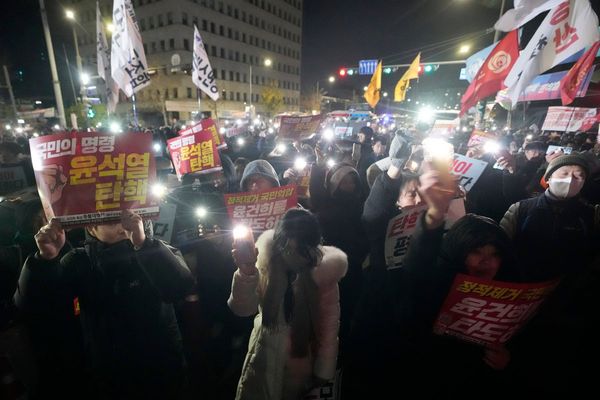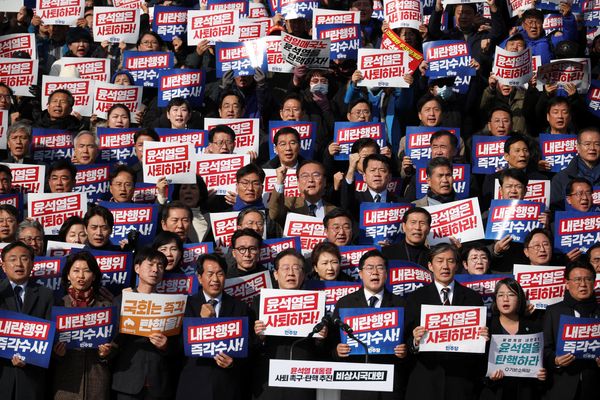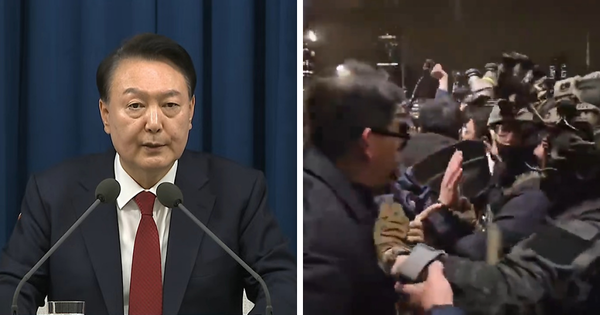
Good morning. South Korea’s president, Yoon Suk Yeol, is facing impeachment after he sent heavily armed forces into Seoul’s streets with his baffling and sudden declaration of martial law on Tuesday. The move stirred memories of past dictatorships in the country, moving thousands to come out on to the streets and protest, with the military powerless, or unwilling, to do anything about it.
Opposition parties submitted an impeachment motion hours after parliament unanimously voted to cancel Yoon’s declaration, forcing him to lift martial law just six hours after it began. Impeaching Yoon requires the support of two-thirds of the national assembly and at least six of the nine constitutional court justices. The liberal opposition Democratic party holds a majority in the 300-seat parliament and has called for Yoon’s resignation. A vote on his impeachment could come as early as tomorrow. Today we’ll look at what happened and why.
In depth: An ‘irrational and anti-democratic measure’
During the tense hours under martial law, heavily armed forces surrounded the parliament, backed by army helicopters and armoured vehicles. Lawmakers climbed walls to get into the building and held off troops by activating fire extinguishers. Politician and former news anchor Ahn Gwi-ryeong tried to pull an assault rifle away from a soldier who had pointed it at her chest as she shouted: “Aren’t you ashamed of yourselves?”
The lawmakers who managed to re-enter the building rejected Yoon’s martial law declaration 190-0, including 18 lawmakers from Yoon’s party, forcing Yoon to rescind it at a hastily assembled cabinet meeting.
***
An ‘anti-state’ plot
Yoon ordered martial law without warning in a speech late on Tuesday, where he vowed to eliminate “anti-state” forces he said were plotting rebellion and accused the main opposition parties of supporting the country’s rival, North Korea.
Yoon gave no direct evidence when he raised the spectre of North Korea as a destabilising force and has long maintained that a hard line against the North is the only way to stop Pyongyang from following through on its nuclear threats against Seoul. In the late 1980s, South Korea had a series of strongmen leaders who repeatedly invoked North Korea when struggling to control domestic dissidents and political opponents. The echoes to today are evident. Yoon has struggled to get his agenda through an opposition-dominated parliament while facing corruption scandals involving him and his wife.
***
What is martial law?
South Korea’s constitution gives the president power to use the military to keep order in “wartime, war-like situations or other comparable national emergency states”. That can include suspending civil rights, like the freedom of the press and assembly, and temporarily limiting the powers of the courts and government agencies. But it also gives the national assembly power to lift the declaration with a majority vote.
Some experts say the way Yoon imposed martial law went far beyond his legitimate powers. The constitution, while giving wide scope to presidents, doesn’t allow them to use the military to suspend parliament. Many also question whether the prosperous, largely peaceful country really faces a situation in any way comparable to war.
***
United in opposition
The Democratic party lambasted Yoon’s actions as undemocratic, with opposition leader Lee Jae-myung, who narrowly lost to Yoon in the 2022 presidential election, calling Yoon’s announcement “illegal and unconstitutional”. The sudden declaration was also opposed by the leader of Yoon’s own conservative People Power party, Han Dong-hoon, who called the decision wrong and vowed to “stop it with the people”.
“The people will block the president’s anti-constitutional step. The military must be on the side of the public in any case. Let’s resolutely oppose it,” Kim Dong-yeon, the opposition party governor of Gyeonggi province, which surrounds Seoul, wrote on X. Meanwhile most South Koreans were left in shock, with social media flooded with messages expressing surprise and worry over events, and thousands gathering on the streets to protest.
***
Why now?
There are claims that the emergency declaration was linked to Yoon’s political struggles. He has had little success in getting his policies adopted by a parliament that has been controlled by the opposition since he took over in 2022, with conservatives arguing that the opposition is taking political revenge for investigations into their own leader, Lee, who is seen as the favourite for the next presidential election in 2027.
Earlier this month, Yoon denied wrongdoing in an influence-peddling scandal involving him and his wife. The claims have hit his approval ratings and fuelled attacks by his rivals. The scandal centres on claims that Yoon and first lady Kim Keon Hee exerted inappropriate influence on the ruling People Power party to pick a certain candidate to run for a parliamentary byelection in 2022 at the request of Myung Tae-kyun, an election broker and founder of a polling agency who conducted free opinion surveys for Yoon before he became president.
Yoon has maintained that he did nothing inappropriate.
***
Echoes of history
South Korea only became a democracy in the late 1980s, and military intervention in civilian affairs is still all too real a memory. During the dictatorships that emerged as the country rebuilt from the 1950-53 Korean war, leaders occasionally proclaimed martial law that allowed them to station combat soldiers, tanks and armoured vehicles on streets or in public places to prevent anti-government demonstrations. While still recent, such scenes are unimaginable for many of today’s young South Koreans.
Park Chung-hee, who ruled South Korea for nearly 20 years before he was assassinated by his spy chief in 1979, led several thousand troops into Seoul in the early hours of 16 May 1961, in the country’s first coup. He proclaimed martial law several times to stop protests and jail critics. Less than two months after Park’s death, Maj Gen Chun Doo-hwan led tanks and troops into Seoul in December 1979 in the country’s second coup. The next year, he orchestrated a brutal military crackdown on a pro-democracy uprising in the southern city of Gwangju, killing at least 200 people.
In the summer of 1987, huge street protests forced Chun’s government to accept direct presidential elections. His army buddy Roh Tae-woo, who had joined Chun’s 1979 coup, won the election held later in 1987 thanks largely to divided votes among liberal opposition candidates.
***
What next?
Politically, pressure has only grown further on Yoon after his late-night bombshell. The Democratic party has demanded that Yoon step down, accusing him of “insurrection”; the country’s main labour union group has also called an “indefinite general strike” until he resigns over the “irrational and anti-democratic measure”. And there’s no support coming from his own People Power party, which described his attempt at imposing martial law as “tragic” and demanded that those involved be held accountable. Associated Press
The front pages
“Starmer pledges crackdown on crime in bid to reboot premiership” says the Guardian while the Mirror leads on “Long Starm of the law” which is also about what it calls the PM’s “neighbourhood cops pledge”. The Telegraph says “China is a major nuclear threat to the West” quoting the head of the armed forces. More on the military in the Mail, this time from the veterans’ minister: “British Army would get destroyed in ‘six months to a year’ of war”. “France in turmoil as Barnier is forced out” – that’s the Times on which subject the Financial Times says “French parliament topples Barnier over €60bn austerity budget”. “I want farmers to feel appreciated” – it’s inheritance tax again on the front of the Express. “Millions will get weight loss jab on the NHS – but face 12 year wait” reports the i. “Crypto cartel smashed” is the top story in the Metro.
Today in Focus
Revisited: The chilling policy to cut Greenland’s high birthrate
In the 1960s the birthrate in Greenland was one of the highest in the world. Then it plunged. Decades later, women have finally begun speaking out about what happened.
The Upside
A bit of good news to remind you that the world’s not all bad
After decades bringing the catwalk to the magazine stand, Anna Wintour is now displaying high fashion in the exhibition hall at London Kings Cross’s Lightroom. Narrated by Cate Blanchett, Vogue: Inventing the Runway uses the magazine’s archive dating back to its first publication in 1892 and brings together leading voices in the industry to explore the history of the catwalk. It includes big luxury names such as Gucci, Chanel, Christian Dior and Prada, as well as younger, buzzy names such as the cult British designer Martine Rose and the French designer to thank for minuscule bags and gargantuan hats, Simon Porte Jacquemus.
“It’s quite nostalgic,” said Wintour. “But it also makes one so proud of the creativity in the fashion world, and I hope that audiences will enjoy seeing the history of the fashion show and how it reflects our culture and changes in the world in a way that is quite extraordinary.”
Sign up here for a weekly roundup of The Upside, sent to you every Sunday
Bored at work?
And finally, the Guardian’s puzzles are here to keep you entertained throughout the day – with plenty more on the Guardian’s Puzzles app for iOS and Android. Until tomorrow.










